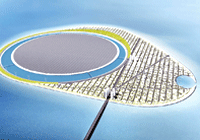 Business & Finance Club - Manama : Bahrain has been identified as a potential location for a revolutionary ‘green power’ island, which could run off solar, wind and hydro-electric power.
Experts proposing a new island off the coast of Manama that harnesses renewable energy say it could also be used as an offshore business centre housing residential and commercial property.
The idea was first floated at the UN climate change summit in Copenhagen last December, but the details have only just come to light.
It would involve construction of an artificial island complete with its own reservoir, which would generate power by collecting water from the sea - activating turbines that produced electricity as water flowed in.
The reservoir would also use solar and wind power, meaning it could be emptied at night before the process resumed the next day.
Danish architecture firm Gottlieb Paludan is behind the idea and claims it could be a self-sustaining city run on renewable energy.
'The Bahrain island is designed with both wind turbines and solar panels, which provide a potential for energy generation 24 hours a day,' said Gottlieb Paludan architect and communication manager Sten Sodring.
'The natural condition of the Manama bay presents a good opportunity to make a new city easily connected to the old city. The main reason for this is, of course, that a close connection with the existing city is crucial for the development of new city neighbourhoods.'
He said it was too early to put an exact price on the project, but speculated that it could cost anywhere between $4 and $7 billion (BD1.5 billion-BD2.6 billion).
The proposal would involve construction of a Green Power Island measuring approximately 12.5sq km, complete with a reservoir with a capacity of almost 119 million cu m.
'The Green Power Island concept focuses on synergies,' said Sodring. 'In the case of the Bahrain island, the synergy focus is on development property - the intention being that the income from sale of island-located urban development property should contribute to financing the island project.
'The island is designed with approximately 9 sq km of urban development area.'
Bahrain has been identified as a possible location for a Green Power Island along with China, India, Denmark and Florida, in the US.
The idea is to combine Green Power Islands with existing and future solar plants and wind farms to store renewable energy on a massive scale, meaning power can be produced even when there is no sun or wind.
'We thought it would be relevant for it to be assigned to the Gulf because of the topographic similarities between our part of the world (Denmark) and the Gulf, both of which don't have mountains,' said Sodring.
'We picked Bahrain because it's an island with a limited area and has become known for its tradition of building artificial islands.'
The proposal is yet to be officially presented to the Bahrain government, but decision-makers said they welcomed any initiative that harnessed alternative energy to produce power.
'It is the vision of the future for us to use clean energy,' said Municipalities and Agriculture Minister Dr Juma Al Ka'abi.
'Renewable energy is the way forward. Without a doubt we will need to start using solar energy and wind energy sooner or later and we would welcome such a project.'
Meanwhile, Public Commission for the Protection of Marine Resources, Environment and Wildlife director-general Dr Ismael Al Madani said in-depth studies would have to take place before such a project could go ahead.
'We need to know if the project is sustainable and measure it in terms of the three pillars of sustainability - which are economic, social and environmental. Because it will be located on reclaimed land, there is bound to be damage to marine life, so we have to study it very well.'
Gottlieb Paludan now hopes to create a demonstration model of the Green Power Island in Danish waters, but Sodring stressed that no date had yet been fixed for work to start.
'There are no plans yet because of the complexity of the issue,' he said. 'It is a debated subject, at least here in Northern Europe, as to how to best store new energy. It is a very significant type of infrastructure project - it has to go through a lot of decisions by a lot of different people, and a lot of people have to agree to it.
'So far it is just an idea, but we are working on plans here in Denmark with the Danish Institute for Sustainable Energy and other partners to make a demonstration project in Danish waters.' |